If you asked your doctor about the health benefits of eating a vegan diet forty years ago, he would have called it bunk. Total baloney! Even today, many doctors aren’t hip to how beneficial eliminating animal products from your diet can really is. This seems off, right? Shouldn’t your doctor be the one person who does know about the health benefits of a plant-based diet? Not exactly.
You see, medical students don’t get much nutrition education. In fact, only 30 percent of medical schools require students to take a nutrition course at all. Knowing this, it shouldn’t come as a big surprise that a plant-based diet hasn’t come up during your annual exam. Your doctor is only prescribing what she is certain will be effective. Historically, this has been medication. However, healthcare providers are slowly but surely coming around when it comes to recommending their patients to a registered dietitian instead of scribbling away on a prescription pad.
In this post, we’re going to take a look at a few of the main health benefits associated with adopting a healthy vegan diet. We know you’re going to be excited about what you read, but please, please talk to your doctor before changing your diet and/or flushing your meds down the toilet. With that disclaimer out of the way, be prepared to be enlightened as to what a plant-based diet can do for your health.
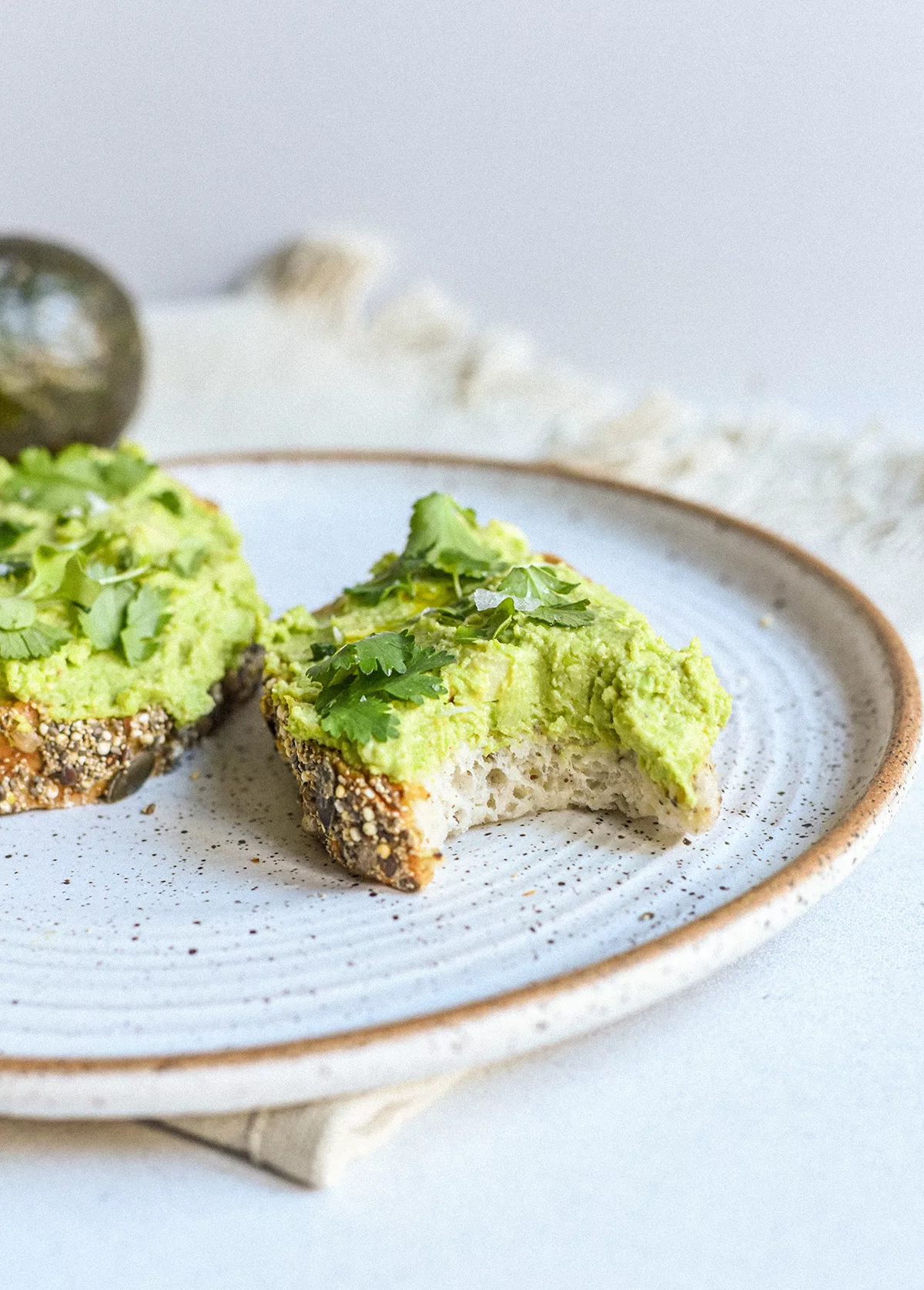
Weight loss
Want to lose weight without even trying? I know, this sounds like the beginning of a cheesy late-night infomercial. But seriously – studies have shown that folks who eat a vegan diet have a lower body mass index (BMI) than omnivores and vegetarians who eat eggs and dairy products.
Side note: Your body mass index is determined by using your weight and height to calculate a number that correlates with the amount of body fat you have. If you’re interested in determining your body mass index, there are plenty of BMI calculators floating around on the Internet. We particularly like the one from the Centers for Disease Control and Prevention.
- An adult who has a BMI between 18.5 and 24.9 is considered healthy.
- An adult who has a BMI between 25 and 29.9 is considered overweight.
- An adult who has a BMI of 30 or higher is considered obese.
Anyway, back to the study. The craziest part about the results is that they held true even when the vegans surveyed weren’t as active as the other test participants. That said, we don’t condone kicking your exercise regimen to the curb the minute you switch to a vegan diet. All we’re saying is that you might see the numbers on your scale drop a little bit faster if you maintain a regular workout routine in conjunction with eating a diet full of delicious and nutritious whole plant foods.
Unfortunately, many folks haven’t been enlightened to the magical effect that eating vegan can have on their weight. The average American diet is high in saturated fat and processed foods, and low in plant-based foods and carbohydrates. This lifestyle is not only making us fat, it’s killing us. According to the Centers for Disease Control and Prevention, more than one third of American adults are obese. That is, 78.6 million U.S. adults have a BMI of 30 or greater. What’s worse, obesity isn’t just a matter of carrying around excess weight. It’s also a main contributor to a bunch of chronic health conditions including heart disease, stroke, type-2 diabetes, and certain types of cancer.
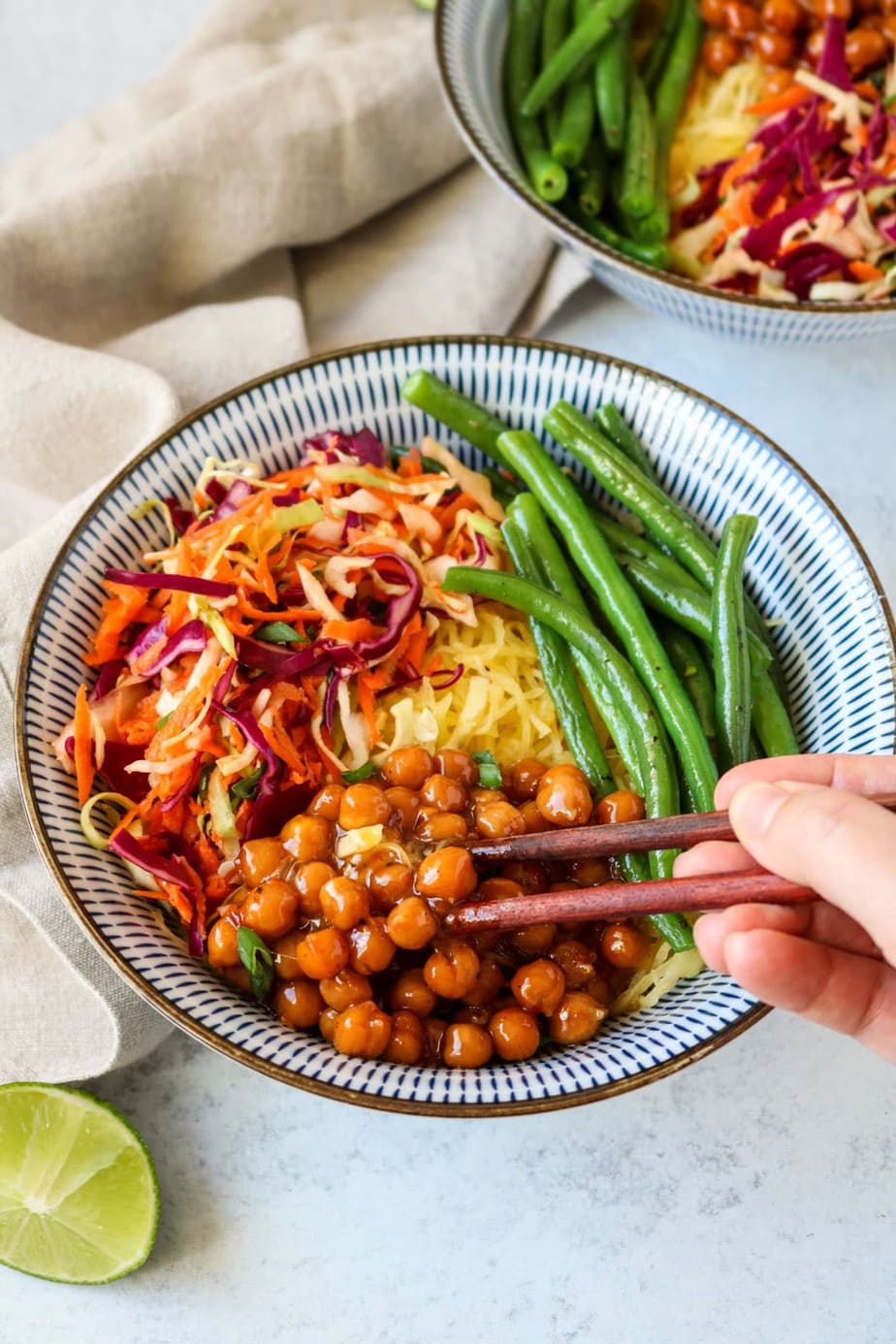
Everything in moderation
As with all diets, everything plant-based must be consumed in moderation in order to be healthy. After all, you could eat vegan pizza, pasta, burritos, and chocolate cake everyday, but that’s not the way to feel good about yourself or to lose those extra pounds. The not-so-secret key to weight loss on a vegan diet (or on any diet for that matter) is to eat less and exercise more. Burn more calories than you’re taking in and you’re guaranteed to win. Eat as many fruits and vegetables as you’d like, make healthy whole grains and legumes a main part of every meal, and use oils (fats) in moderation.
Gram for gram, fat has twice the amount of calories than anything else on your plate. That’s why many folks try switching to a low-fat diet in their quest to drop a few pounds. But for us vegans, we need that fat to feel satisfied at mealtime. In fact, eating a little bit of fat can make it easier to stick with a plant-based diet in the long term. The important detail here is that they should be the right kinds of fats. Everything from olive oil, to peanut butter, to avocado counts as a healthy fat and should be included as part of a balanced vegan diet.
While the difference between calories in and calories out is the main influencer of weight gain and loss, there’s actually a little bit more to the equation. Where you get those calories also plays a role in dieting success. For example, evidence suggests that eating enough protein does a better job of staving off hunger than do carbohydrates and fats. Adding a source of complete protein to every meal will help you achieve that satisfied feeling without consuming a ton of calories to get there.
The term “complete protein” indicates a food contains all of the essential amino acids. Essential amino acids are those that our bodies cannot make on their own. Therefore, we have to supplement them through our diets.
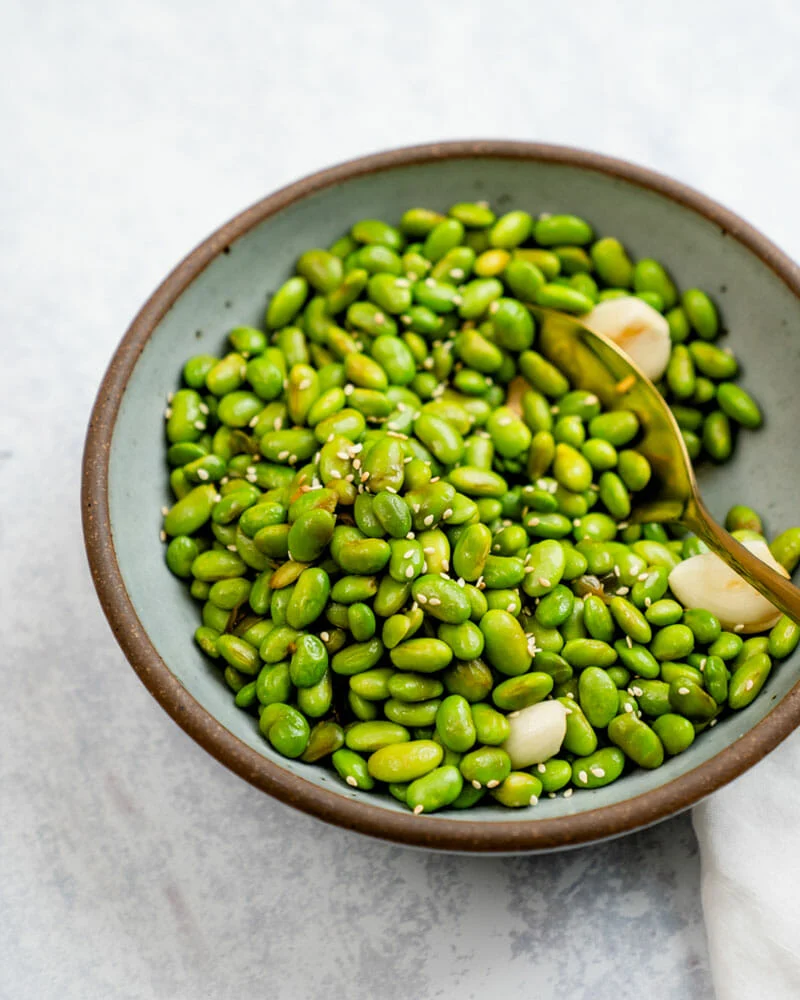
Read more:
Establishing a plan for success
Most diets are designed to decrease a person’s daily calorie intake so they’ll lose weight. This makes sense, right? After all, the main influencer of weight gain and loss is the difference between calories in and calories out. If you burn more calories than you consume, you’ll see the numbers go down on the scale. Simple. So why do so many people fail to keep the weight off? Well, if you look at what a diet really is – it’s temporary. When you don’t have a long-term plan for maintaining that initial weight loss, it’s all too easy to fall back into old patterns. And guess what? Those pounds you worked so hard to drop will come right back.
Unfortunately, the same principle holds true with a vegan diet. That’s why we stress the importance of looking at your journey into plant-based bliss as a lifestyle change. Set some realistic goals, go at your own pace, and establish healthy eating habits to replace the old ones that were weighing you down and making you feel like garbage.
Heart disease
Heart disease (which causes heart attacks) is the leading cause of death for both American men and women – by a landslide. Roughly 600,000 people die of heart disease in the United States every year, which comes out to about one in every four deaths. In fact, heart disease is so widespread and deadly that The American Journal of Cardiology reported that the only way to prevent heart disease is to either switch to a vegan diet or take medication to keep cholesterol in check. No kidding.
Given the choice, why would you willingly sign up for lifetime of doctor visits and prescription drugs when you can skip the ordeal and the medical expenses that go along with it by eating plant-based foods? After all, that’s where the real preventative power lies. In fact, making changes to your lifestyle can lower risk of heart disease by as much as 80 percent. But, this is only true if you implement a regular exercise routine and your diet is carefully planned to include essential nutrients.
In a series of surveys collected by and reported on by The American Journal of Clinical Nutrition, there is substantial evidence that indicates plant-based diets including whole grains, fats, an abundance of fruit and vegetables, and adequate omega-3 fatty acids can play an important role in better heart health and preventing cardiovascular disease. If your diet contains too many calories, red meat, processed foods and a ton of saturated fat, you’re not doing yourself any favors, and you probably won’t like the results on your next cholesterol test.

Cholesterol
Low-density lipoproteins (LDL) cholesterol is known as “bad” cholesterol and is a big contributor to the development of heart disease. Those with high LDL cholesterol levels are at a greater risk for a heart attack from a sudden blood clot in an artery narrowed by atherosclerosis. Oftentimes, doctors will prescribe patients with high LDL levels a medication called statins, which is the most commonly used cholesterol-lowering drug.
While it’s extremely effective, there are some serious health risks that come along with statins including reduced glucose tolerance and a higher risk for diabetes. So, while you’re getting one health problem under control, you’re essentially opening the door for a host of other issues to arise. Worth it? I think not. Especially when vegan diets are consistently demonstrated to lower LDL cholesterol by up to 25%. But that’s not all. When you throw extra fiber from whole foods into the mix, LDL levels have been shown to improve by up to 35%. On top of this, plant-based diets have been proven to reverse diabetes.
So, why aren’t more doctors prescribing a plate full of fruits and veggies instead of a bottle of pills? Great question. The unfortunate truth is that for doctors, pumping their patients full of drugs is a much easier solution than proposing a full-blown vegan lifestyle change. There are two main reasons for this. Many doctors A.) are not knowledgeable enough about nutrition to give sound recommendations or B.) don’t think most people would actually make such a drastic change to their lifestyle, and therefore don’t bother bringing it up.
Luckily, you now have the knowledge and the motivation to do just that. So, when given the choice between taking a drug that will lower your cholesterol but will increase your risk for diabetes and switching to a plant-based diet that will lower your cholesterol and prevent – heck, even reverse diabetes – the choice seems pretty obvious. Doesn’t it?
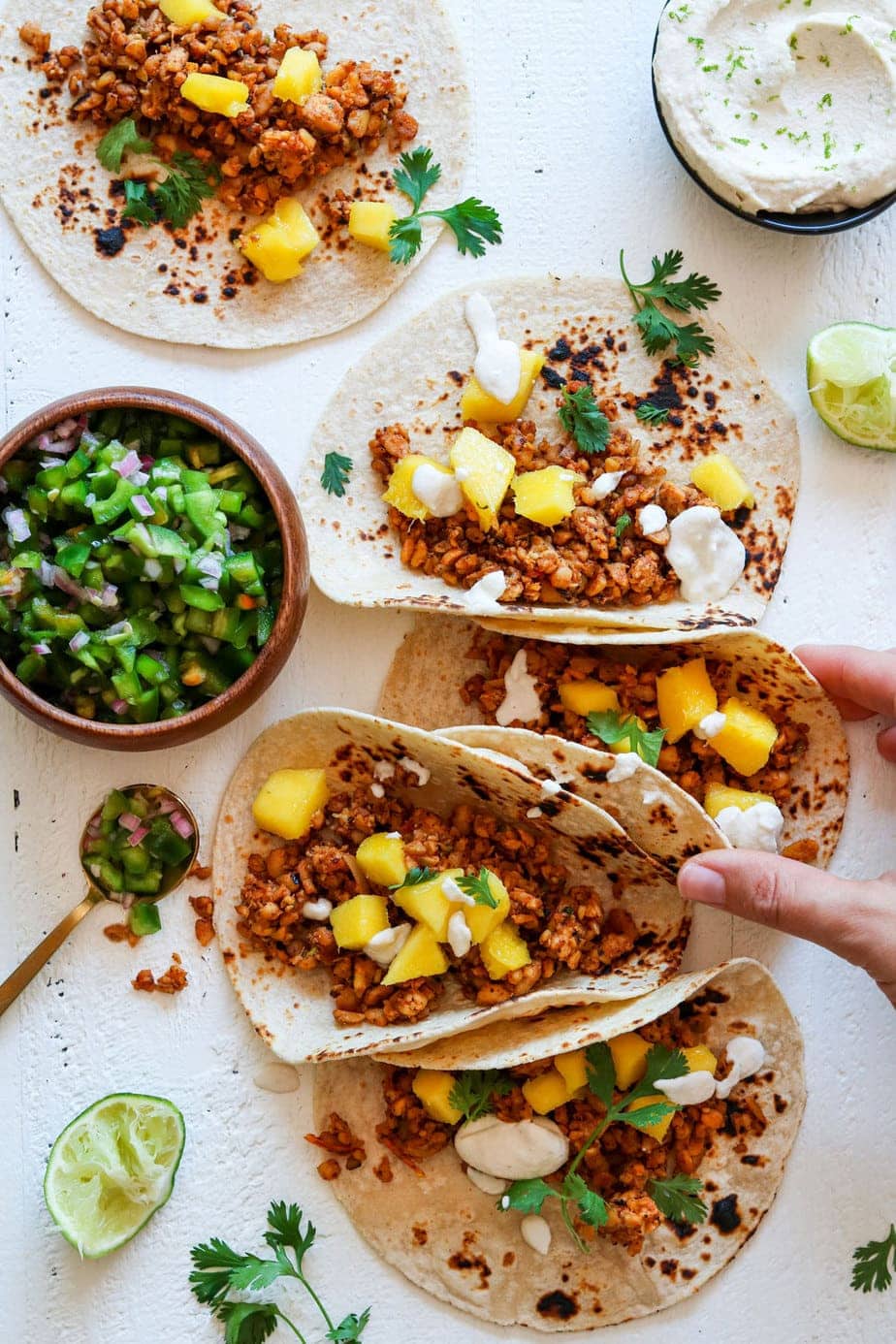
Diabetes
Though not as lethal as heart disease, diabetes remains one of the biggest killers of our time. Nearly 70,000 people died from diabetes in 2010, making it the seventh leading cause of death in the U.S. However, diabetes didn’t used to be as widespread as it is today. From 1980 through 2011, the number of U.S. adults aged 18 years or older with diagnosed diabetes more than tripled (from 5.5 million to 19.6 million). Unfortunately, this number is still on the rise despite efforts to eliminate high fructose corn syrup from the market and to add nutritional information to menu items in restaurants.
The latest statistics from the Centers for Disease Control and Prevention show that 29 million Americans have diabetes and another 86 million have pre-diabetes. Those who suffer from diabetes are at a much higher risk for heart attacks, blindness, amputation, kidney failure, and painful nerve symptoms than those who don’t have diabetes.
Luckily, there is hope to turn it all around. A recent report shows that one simple prescription could help reverse diabetes, allowing the 115 million Americans with diabetes or pre-diabetes to radically reduce their medications or stop taking medication all together. Nope, it’s not a miracle pill. It’s a vegan diet.
A team of researchers from the U.S. and Japan found that a plant-based diet boosts blood sugar control considerably. And I’m not talking about the long-term effects, here. In as little as 22 weeks, participants who ate a vegan diet saw their hemoglobin A1C (a key indicator of blood sugar control) improve as much as 1.2 points. This number may seem small to the average Jane or Joe, but anyone with diabetes knows that an improvement of this magnitude isn’t something to scoff about. There is no drug on the market that comes close to making such a profound impact on the lives of those suffering from diabetes.
If you’re one of the millions of Americans who has diabetes, don’t be surprised if your doctor suggests a plant-based diet before you even bring it up. Healthcare providers are finally realizing that eating vegan isn’t just a trendy hippie diet. They’re noticing that eliminating animal-based foods is making a measurable difference in the health of their patients. In fact, doctors at Kaiser Permanente, which is the largest managed care organization in the U.S., have begun recommending that every patient receive information about a plant-based diet along with a list of registered dietitians who can help them make the switch to healthy plant-based foods.
High blood pressure
Blood pressure (or hypertension) is the force of blood pushing up against the walls of your arteries. It’s perfectly normal for your blood pressure to rise and fall throughout the day. For example, your blood pressure may spike when you get a phone call from an angry client, and it typically drops when you wind down to go to sleep at night. It’s when your blood pressure stays high for an extended period of time that you develop a risk for heart disease, stroke, and kidney failure. Perhaps one of the scariest statistics about high blood pressure is that 20 percent of American adults don’t even know they have it. There are no signs or symptoms. That’s why it’s so important to have your doctor check your blood pressure during your annual exam.
According to the Centers for Disease Control and Prevention, about one third of American adults has high blood pressure. That’s 67 million people at risk for damaging their hearts and developing serious health problems. What’s more, an additional one in three American adults has pre-hypertension – blood pressure numbers that are higher than normal, but are not yet in the high blood pressure range. Unfortunately, only about half (47%) of people with high blood pressure have their condition under control. Plus, while medication can be very effective at lowering blood pressure, it does nothing to address or resolve the original cause of high blood pressure. This startling information emphasizes the need to switch to a plant-based diet.
A study published in the January 2012 issue of Public Health Nutrition included a survey of a group of vegans, lacto-ovo vegetarians, partial vegetarians, and omnivores to measure the effect of diet on blood pressure. The results were amazing. Those categorized as vegan had a 60% lower risk for hypertension compared to omnivores. That's lower blood pressure. This likely has something to do with the fact that vegans are typically lean, and body mass index (BMI) is a strong predictor of blood pressure.
However, even if your BMI is in the healthy range, it’s still important to pay close attention to your sodium intake as to not exceed the recommended daily limit of 2,300 mg per day. Consuming excessive amounts of sodium, even on a vegan diet, is a big contributor to high blood pressure, heart attack, and stroke.
In conclusion, adopting a vegan diet can provide numerous health benefits, including reducing the risk of chronic diseases, promoting weight loss, and improving overall well-being. While it may take some time and effort to adjust to a vegan lifestyle, the health benefits are well worth it. With the increasing availability of vegan options and the growing awareness of the environmental and ethical implications of animal agriculture, there has never been a better time to embrace a vegan diet. So, if you're looking to improve your health and make a positive impact on the world, consider going vegan today!
Ready to get started?
Check out our Beginner's Guide to Going Vegan, Plus Free Meal Plans!
References:
- http://www.cdc.gov/obesity/data/adult.html
- http://www.cdc.gov/obesity/adult/defining.html
- http://www.cdc.gov/healthyweight/assessing/bmi/adult_bmi/english_bmi_calculator/bmi_calculator.html
- http://www.cdc.gov/heartdisease/facts.htm
- http://ajcn.nutrition.org/content/78/3/544S.full
- http://www.cdc.gov/diabetes/statistics/prev/national/figadults.htm
- http://www.diabetes.org/diabetes-basics/statistics/
- http://www.huffingtonpost.com/neal-barnard-md/a-prescription-for-a-plan_b_6178622.html?utm_hp_ref=healthy-living
- http://www.onegreenplanet.org/news/eating-vegan-is-the-new-prescription-to-treat-diabetes/
- http://www.cdc.gov/bloodpressure/facts.htm
- http://www.vrg.org/blog/2012/02/01/vegans-less-likely-to-have-high-blood-pressure/
- http://www.cdc.gov/features/dssodium/
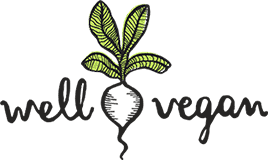

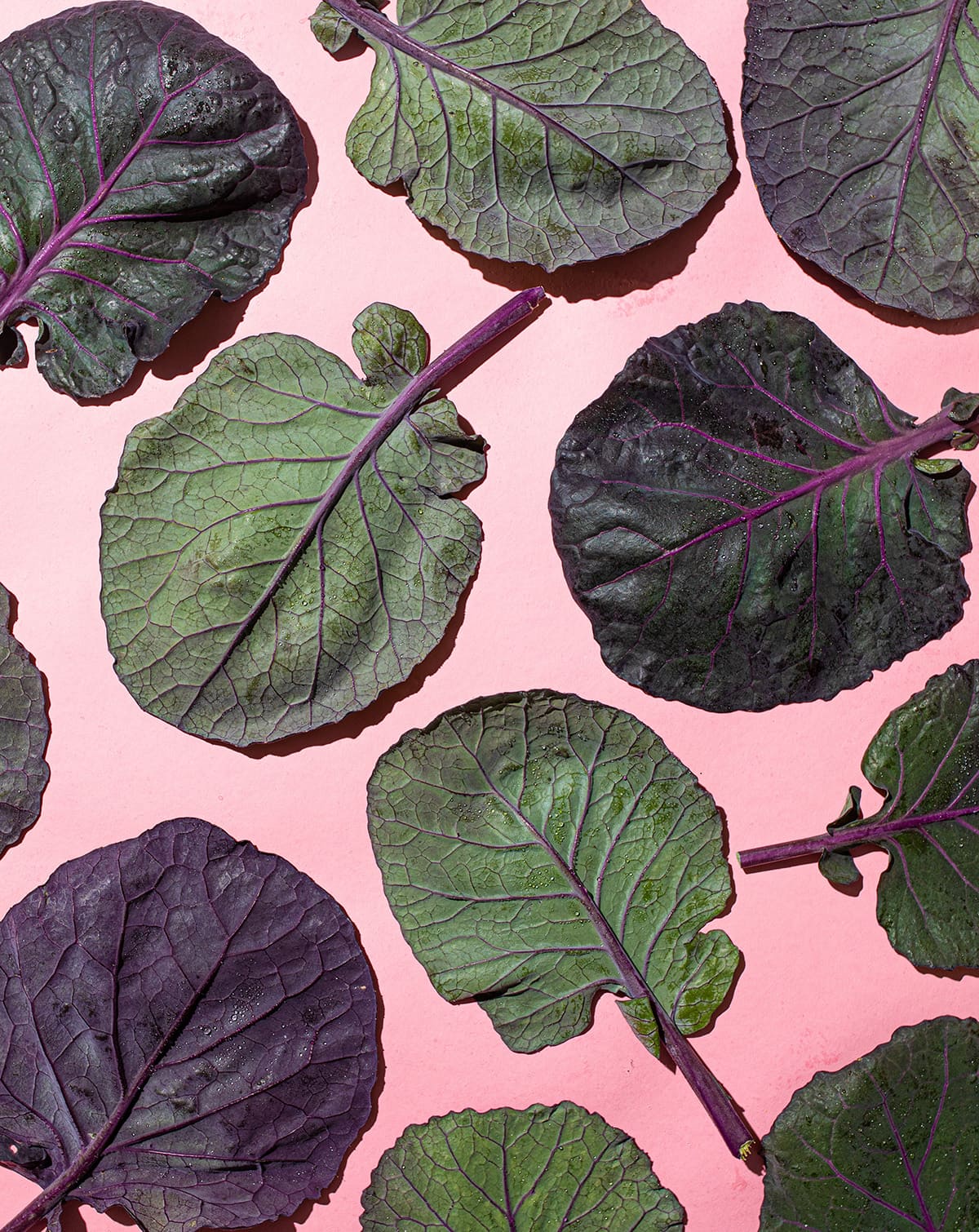
Leave a Reply